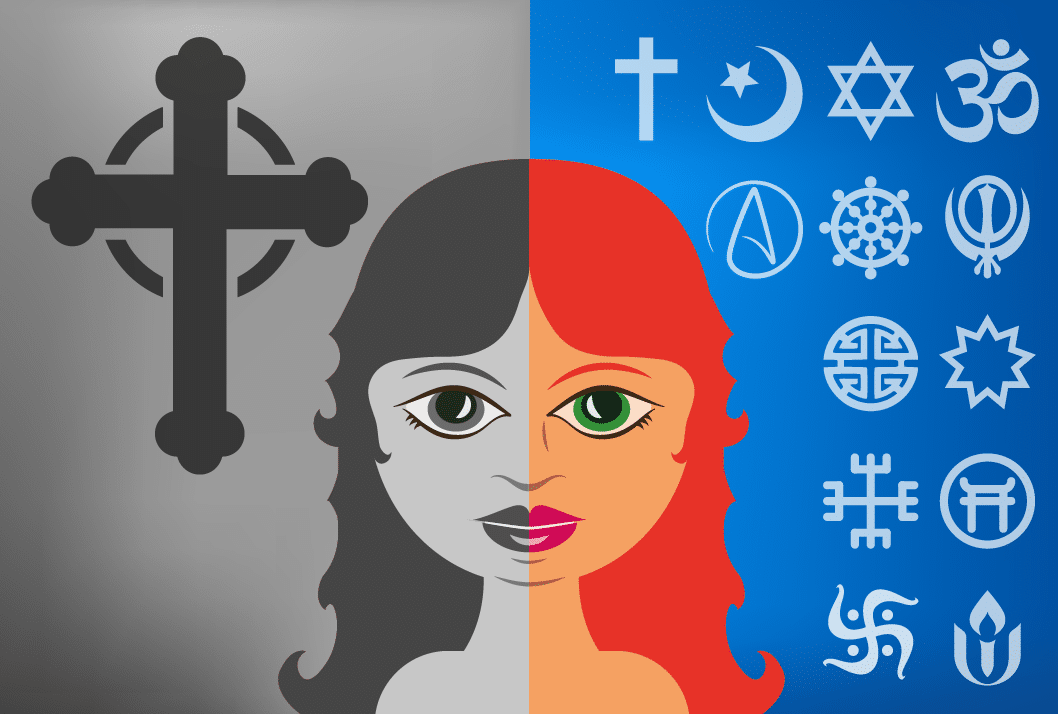The state of Spain, is it secular or non-denominational?
Spain is a Secular State is one that does not support any single religion, but enjoys freedom and diversity in terms of religious structure or denomination. If you want to know everything about Spain and understand why it is or is not a secular state, we invite you to continue reading.
secular state
Spain is a secular state , and “secular” is the term used to designate a nation or country, which, as mentioned above, functions in a sovereign manner of any structure or religious confession or of any religion.
In other words, it simply means that, from a legal point of view, there will be no official cult or creed in the political status of the nation. Religious faith is something that each person must achieve by doing it on their own free will and not through coercion, be it from our parents, peers or the government.
Since the beginning of liberalism, three aspects related to what identifies a secular state have been deduced?
The first aspect refers to the fact that each person, in their entirety, complete and full right to free will, can experience or profess the creed that best suits their religious ideology, yes, as long as this does not violate the freedom of third parties. .
The second aspect refers to the fact that the state (government) will not be able under any concept to decree any Church, religion, or creed as “official”. This due to a matter of respecting the freedom and diversity of belief of each of its citizens.
The third aspect is quite similar to the second, with the exception that the state (government) as well as cannot and should not establish a church, religion or creed as “official”, neither should nor can it under any circumstances promote atheism among its members. people, because it must respect their individuality and freedom of spiritual beliefs.
Spain is a Secular State : From a financial point of view, a secular state should not provide financial support to any religious group or church, either by creating specific taxes, by directly transferring public capital to religious structures, by tax exemptions or legal freedoms.
However, just as it follows from the principle of individual autonomy that the administration should stay away from financially supporting religious groups, in the same way it must also be concluded that the application of this principle should not be limited to different beliefs. In other words, the government should not support any economic sector, be it institutional, trade union or official.
From the point of view of finance, the church is a group of influence as are the unions, public workers and businessmen. Just as the government sullies individual freedom when it supports religious groups, in the same way, the government violates individual freedom when it supports any pressure group or supports gender politics.
Is Spain a secular or non-denominational state?
The million dollar question, is Spain a secular state ? Or rather it will be non-denominational, what does each of them mean? what is the difference between them? what are their characteristics? This and much more, we will develop throughout this article.
Let’s start in 1979, where the Constitution abandoned Franco’s ultra-Catholic Spain and enshrined in article 16 the guarantee of religious freedom and worship and that no confession would have a state character. Section 3 highlighted that the state (government) would assist its people through the Catholic Church, which represented a contradiction to its own constitution.
The pacts with the Holy See in 1979 laid the foundation for the privileges that the Catholic Church has today. In this, they added specific clauses on the correspondence to the link between Church and education or Church and taxation, among others.
In its article I, the Spanish State recognized the Catholic Church, and gave it freedom to exercise its evangelizing mission, even guaranteeing a sovereign and public exercise of its own practices, that is, teachings, competencies and cults.
Spain is a secular state , but what is a non-denominational state? Simply when there is no “official” confession, while a secular country, on top of that, has a complete estrangement between church and state.
Although the concept of “non-denominational State” does not group together, or rather, does not recognize as “representative” any specific religion, church or belief, it does allow the possibility that there may be “collaborative agreements” (of monetary aid mainly) with certain religious institutions.
So, had they transformed Spain into a non-denominational country? These pacts and the facts seem to show that not so much, as the thesis of this term suggests.
Public positions that are entrusted to virgins in public events, swearing-ins on the Bible, religion in schools, are these actions typical of a country that is theoretically non-denominational?
Let’s analyze it a bit. If the Spanish Constitution implements non-denominational as a principle, the Government must then declare that no confession will have a governmental character.
The public authorities will be able to maintain relations both with the Catholic Church and its collaborations, as well as with the various confessions of the Spanish ilk. The Magna Carta of Spain rules out the situation of an independent state of any confession or religious alignment.
However, the current Spanish regime has suggested that the starting scenario is not to their liking and seeks to give it another direction within the regulatory framework. To give content to this new environment, the Arrupe Madrid Forum invited Manuel de la Rocha, lawyer, member of the Socialist Left and former PSOE deputy to make an explanation of it.
According to De la Rocha, the root of the predicament lies in investigating whether a modern State can revolve around a religion or rather on the autonomy of the individual with a secular projection. No one, according to the speaker, has priority over ethics.
Spain is a Secular State : Based on this platform, De la Rocha indicated that the PSOE wants to limit various situations claimed by certain groups in Spanish society.
These circumstances include: homosexual marriage, a simple divorce process, experimentation with stem cells, euthanasia, the rejection of fundamental religious matters, and of course ending the unequal subsidy of the Catholic Church in Spain.
According to the rapporteur, these solutions are confusing, but they do not have to be catastrophic; There were few voices that accompanied this vision with hope in the Arrupe Madrid Forum. Most of the spectators saw rather a clear anti-Catholic militancy and not a mere secular exercise.
On the other hand, many of the attendees insisted that these socialist wishes did not reflect the true social problems of the majority of the country, while many of these remained unanswered, let’s say housing.
Leaving aside the legality or not of a similar ethical basis with this long decalogue of the PSOE’s desires, some attendees of the Arrupe Madrid Forum questioned why there was so much promptness to regulate situations whose effects could be highly harmful for certain groups.
To regulate these situations, who was going to protect the rights of those adopted within a homosexual family, the rights of life potentially demolished to be able to investigate with stem cells, the rights of people who are exercised euthanasia, and the rights of parents who request that their children receive religious and moral instruction that is in accordance with their own opinions and who want to attend public education?
In short, it is not explained how situations and ancient organisms, which have proven their goodness and rigor since the beginning of humanity, are going to change at a stroke of the pen, without a well-established scientific basis that supports it.
Some even wondered if the only thing the PSOE was trying to do was respond to an ideology with no intention of resolving real problems, no matter what.
De la Rocha stressed that the root of the problem is political. What is needed is for people to litigate these ideas deeply, knowledgeably, and respectfully. However, and regardless of the position of the speaker, there is another way to understand politics.
In countries with a long democratic and secular habit, the positions of an important representation of Catholic congregations in the face of arguments similar to those discussed have had as a response that the faithful take active militancy in the protection of their convictions.
Spain is a secular state . Perhaps this is the step that Spanish Catholics have to take, organizing themselves and going out into public life to defend themselves and their ideas.
History
Many nations, before the 20th century, considered themselves confessional, that is, they showed by ordinance of the monarch or respective constitutions, that the State, although allowing the free practice of an extensive list of diverse religions, recognized a religion as “official”.
It was not something strange that the Spanish State hindered or hindered in matters of the clergy, or vice versa. For example, veto the Pope elected by the Conclave. Today, most states declare themselves non-denominational or secular. This was more common after the French Revolution.
Features
Spain is a secular state because it treats all its inhabitants equally, both practitioners of any religion and those who are considered “atheists” or non-believers. Thus, discrimination based on religious philosophies is avoided, and furthermore, a definitive confession is not favored in any way.
In general, in the secular State there is no “State religion” or the like and the separation between the Church and the State is maintained.
In case there is a religion in which special treatment is adopted by the regime, said importance would have a purely emblematic meaning, which would not affect the ordinary existence of its residents or their rights, mainly in the fact of not making well-founded distinctions in the religion of each person.
There is a major discrepancy between secular states and atheist states, as is the case in Albania under Enver Hoxha, and other communist governments, where the state explicitly opposes any religious faith and practice.
Not all designated secular states are fully secular in practice. In France, Spain and a large part of Latin America, most Christian commemorations are public holidays, Peru legally protects the Catholic revelation although it allows other confessions, in Spain the educators of the Catholic religion are proletarians of the State, although in France public schools do not have religion courses.
Many states like Spain is a secular state , have had legal traces of a particular religion. Secularism has various forms that can coincide with various degrees of official religiosity. Thus, in the Commonwealth, the head of state must have been crowned according to the Coronation Oath Act of 1688, thus promising the protection of the Anglican faith.
The UK also maintains 26 Church of England clerics known as Spiritual Peers. The opposite path also occurs: from secular State to theocracy, as in the case of Iran, where the secularization of the State of the Pahlavi dynasty was replaced by the Islamic Republic.
List by continents
In this part, we offer you a list (albeit incomplete) of some States officially declared secular in 2012.
Africa
Angola
Benin
Botsuana
Burkina Faso
Burundi
Cameroon
Cape Verde
Chad
Democratic Republic of Congo
Republic of Congo
Ethiopia
Gabon
Gambia
Guinea
Guinea-Bissau
Equatorial Guinea
Liberia
Small ones
Mozambique
Namibia
Rwanda
Sao Tome and Principe
Senegal
South Africa
America
Aruba
Bahamas
Belice
Bolivia
Brazil
Canada
Chile
Colombia
Cuba
Curacao
Ecuador
United States of America
Guatemala
Guyana
Honduras
Jamaica
Mexico
Nicaragua
Paraguay
Peru
Puerto Rico
St Martin
Surinam
Trinidad and Tobago
Uruguay
Venezuela
Asia
Armenia
Azerbaijan
People’s Republic of China
Hong Kong, People’s Republic of China
Macao, People’s Republic of China
Democratic People’s Republic of Korea (North Korea)
Republic of Korea (South Korea)
Filipinas
Georgia
India
Japan
Kazakhstan
Kyrgyzstan
Mongolia
Nepal
Singapore
Tajikistan
Thailand
Taiwan
Timor Oriental
Turkmenistan
Turkey
Uzbekistan
Vietnam
Europa
Albania
Germany
Andorra
Austria
Belarus
Belgium
Bosnia – Herzegovina
Bulgaria
Croatia
Cyprus
Czech Republic
Slovakia
Slovenia
Spain
Estonia
France
Hungary
Ireland
Italia
Latvia
Lithuania
Luxembourg
Norway
North Macedonia
Moldavia
Montenegro
Netherlands
Poland
Portugal
Within the United Kingdom there is a differentiation in this sense: England is a Confessional State that recognizes Anglicanism as the official religion, but this is not the case in Scotland, Wales and Northern Ireland.
Romania
Russian Federation
Serbia
Swiss
Ukraine
Oceania
Australia
Federated States of Micronesia
Better
Guam
Northern Mariana Islands
Solomon Islands
New Zealand
Palaos
Papua New Guinea
Former Secular States
Pakistan (1947-1956) After the application of the 1956 constitution, Islam is established as the state religion.
Bangladesh – Proclaimed a secular republic with independence in 1971, President Hossain Ershad instituted Islam as the state religion with the eighth amendment to the Constitution (June 1988), citing the need to combat fundamentalist movements.
Iran, secular state in 1925 with Reza Pahlavi as Shah. Islam is reinstated as the state religion in December 1979 with the adoption of a new Constitution.
Madagascar (1960-2007)
Afghanistan Establishes Islam as the state religion.
States with the proposal to be Laity
Currently, Costa Rica is a confessional State recognized in section 75 of the 1949 Constitution, which supports the Catholic religion as the official religion of the state, ensuring that the government and the State contribute to its maintenance and financing, but ensuring the freedoms individuals of conscience and worship, as long as they are not opposed to “universal morality or good customs”.
Spain is a Secular State : The constitutional reform, presented in May 2019, in Costa Rica, could change the current wording in favor of state secularism.
In the Legislative Assembly of Costa Rica, three bills have been presented that seek to reform this constitutional article; however, they have been archived. Currently, it is in the legislative current under file 21,380, the project of the social-Christian deputy, who has assured that the proposed reform seeks to grant legal security to the plurality of religions that coexist in the country, as well as to those who do not they believe in none.

Hello! Let me enthusiastically introduce myself as a dedicated blogger fueled by an intense passion for meticulously crafting insightful and well-researched blogs. My mission revolves around providing you, dear readers, with a veritable treasure trove of invaluable information.







